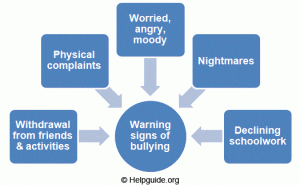Protecting Your Child From A Bully

There are few things more frightening to an adolescent than being the victim of a bully. The National Center on Educational Statistics reports that 28% of children in 6th to 12th grade have admitted to being a victim of bullying, while 30% of that same population admitted to being a bully. Bullying is a rapidly growing problem in the US and impacts the emotional and physical wellbeing of the victim. With bullying moving from the playground to cyber space, today’s victims are struggling with anxiety and depression that in some cases result in attempts at suicide.
So how do you protect your child from bullying?
-
- Get Involved. As a parent, involvement in your child’s life remains critical to leading them in the right direction when making life decision. At the beginning of each school year, review all the ways that you (and your co-parent) can get involved with your child’s school and get to know those that are impacting your child’s life on a daily basis. Join the PTA to meet other parents and build relationships with the teachers and school counselors. Once a bond has been formed with that administration at your child’s school, alerting you will be top of mind when a change has been noted in your child’s behavior or they have been involved in an incident of bullying.
-
- Get a Plan. As a parent, familiarize yourself with your state’s laws and the legal steps you can take to protect your child. Knowledge is power, and knowing your options will keep you from losing your cool when dealing with a bully. Sit down with your child and come up with a plan together on how your son/daughter can deal with a bully and set guidelines to when as a parent you will step in. If you find out your child is being bullied and you are conflicted on what the best course of action to take then reach out to a professional such as your church staff or a family counselor. You set the example for your children on how to deal with high stress situations and this critical moment is fertile ground for teaching an invaluable life lesson. Once you have formulated your plan, review it with your child until you both feel confident in your “Anti-Bullying” plan. When your child feels secure with a plan they are much more likely to open up to you about what is going on in school. Providing a list of potential solutions will most likely give your child the tools to deal with bullying if and when the situation arises.
-
- Get Physical! Get your child into a physical activity that will help to build their self-esteem. Bullies, while often lacking personal self-confidence, prey on the insecurities of others. Exercise will not only help your child reduce stress, it also helps them develop a circle of friends they can lean on for support. The practice of karate, a sport that relies on self-discipline and respect for self and others, has shown to have a very positive impact on self-confidence and maturity. When choosing a sport, select an instructor that teaches talking through problems and choosing a non-physical approach to resolving conflicts. Helping your child to learn how to make decisions based on rational thinking is a life skill that they will carry well into adulthood.
-
- Get Talking! Set aside time every night for focused communication with each child individually. Your children face struggles daily, whether it’s the fear of failing a test, not being picked for the school play or being bullied by a classmate. Try setting aside 20-30 minutes every night to discuss the highs and lows of their day. Ask about what they enjoyed most about their day, what did they do that they are proud of and what scared them? Use this time to share the challenges you have faced, the steps you took to deal with conflict or fear, and the lessons you learned from the experience.
Listen, listen VERY HARD.
So many times, kids don’t communicate verbally. Take note if your child becomes withdrawn. Listen for the fear in their voice and watch for changes in behavior. Children often feel it is a failure within themselves that has caused them to become the subject of bullying. Look for the signs of bullying before it gets out of hand.
